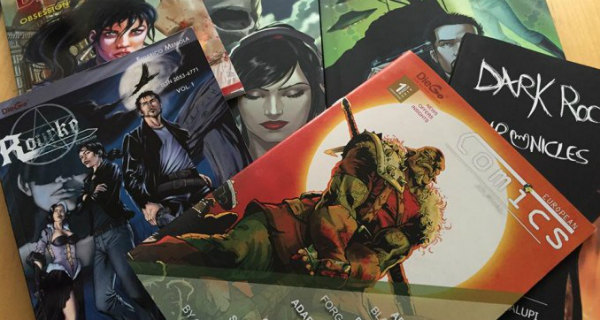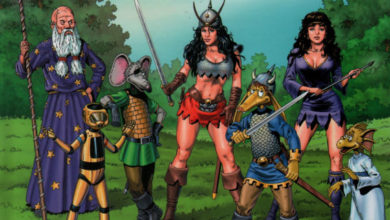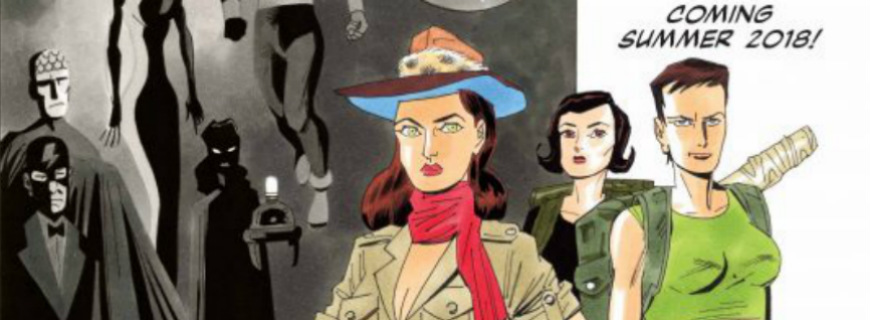Interview with Giuseppe Pennestri – Owner of Diego Comics

Dreaming about a job in Comics? Comics and graphic novels have been enjoying quite a bit of popularity in Israel in recent years. In order to show some respect also to this aspect of the publishing world, and in honor of Free Comic Book Day, we invited the owners of DieGo Comics publishing for a chat about independent comic book publishing and the challenges faced by comics creators outside the US and the UK.
Hi Giuseppe, First of all, thank you for agreeing to hold this interview, and for bringing to the public such wonderful comic books.
Hi Nadav, thanks for having me.
Could you please tell us about DieGo Comics? How it was born, when, how many titles have you published so far, and so on?

Diego Comics Publishing was founded in November 2012. My sister Marcella and I started to work on the project about a year earlier, but I’ve had it in mind to found a publishing house for years. We both grew up in an environment which was rich with books and comics, and our parents were avid readers themselves. “It’s in my family,” quoting Luke Skywalker – ‘My father had it, I have it, my sister too, and …’ ^__^ Let’s hope my niece will follow our footsteps.
Back to your question, we decided to make a living of our passion—without much luck until now, considering that I have two jobs to pay the bills and push ‘Diego’ forward. My sister and the other members of the crew – Denise, Nigel, Matthew and Emma – all have day jobs too, and devote their free time to the project. Consequently crowdfunding is an important part of our financing strategy. Marcella and I have invested our savings to start the company. We were aware that entering the distribution channels and building a consistent reader-base would not be easy, but passion is passion. We strongly believe that the authors we publish deserve to reach a wider audience, beyond national borders. Personally, I see my effort as a “Rosetta Stone” operation. Translating authors is a way to preserve their works, not merely to expand their readership. Unlike major Publishers who invest to make money, we at Diego also have other targets, too, although, of course we also have bills to pay.
To date we have had four main authors published and several more whose work we published as short stories. Our publications include three graphic novels, Desdemona – a mystery crime set in Firenze; Rourke the Hexbuster – a supernatural horror comic about the adventures of a supernatural detective of sorts and his daughter; Adam 2.0 – a conspiracy sci-fi series; and Dark Rock Chronicles a contemporary horror novel with a lot of heavy metal. All in all, we have printed up until now six volumes of comics and two magazine issues. Beside comics, I plan to increase the translation of fiction, with five books a year by 2016. Moreover, we recently launched “European Comics Journal”, a news magazine dedicated to authors and illustrators. The first issue was distributed for free at a London Comic Con in March, and was funded on Kickstarter. We are currently running a new fundraising campaign to fund the second issue. In my marketing strategy, both “European Comics Journal” and Kickstarter are important tools.
Here are the links for a free preview for European Comics Journal #01
and the crowd-funding campaign on Kickstarter
How do you choose which pieces to publish?
Personal taste. I won’t publish a book that I have not read and enjoyed myself. For example, we focus on fantasy and sci-fi titles, but I won’t publish a ‘bad’ zombie story just because zombies are popular. I regularly attend book and comics fairs across Europe and select titles that I find interesting. We also receive submissions by creators. Then Marcella – who is my business partner – and I, read them. We look at the illustrations and story, we discuss our opinions (these are often diametrically opposed), and then we decide if we want to go ahead or not.
What are the stages of publishing a comic book, and how different are they from “ordinary” book publication?
They are actually not that different. In our case, the first thing is to have the works translated, edited and proofread. Then we pass the files to the letterrer, and then we proofread them once again. Meanwhile, we choose the edition format – paperback or hardback – and the illustrator for the cover. When all these phases are done, it’s time for our graphic designer to create the final file to be forwarded to the printer. Then starts the most difficult part of the publishing process: marketing. The marketing of new series starts the day before we decide to publish a book and never ends. 🙂
Could you tell us a little about the challenges faced by an independent comics publishing house?

Well, I can say that Moses had an easier time when he crossed the Sinai dessert than I had starting a publishing house – and not just because he was backed by the higher spheres. As I told you earlier, financing is the biggest challenge – as in any venture. Sound finances help to solve most of the common challenges – production, marketing, etc… There are, of course, other challenges not connected with money, like finding the right words during a translation. All our translations are a team effort: the translator, an English native speaker, adapts the original text into English; then I read the adapted text, and check to see if it is as loyal to the original as possible. Eventually I make my notes and discuss them with the translator until I am happy with the result. The translation is not a word for word. We have to rewrite the book in another language, while trying to stay as close as possible to the spirit of the original text. Finally, we pass the text on to the proof reader, who speaks only English, for the final editing.
Authors’ ego is another challenge. Actually I might go as far as to say that it is easier to raise funds than to deal with some authors. Diplomatic skills are essential here. All emerging authors expect to reach the popularity of authors who have been successfully published for years in a short time (a very short time). Meanwhile, veteran authors who have enjoyed success in their own country have difficulty understanding that translating the text doesn’t necessarily “translate” their popularity at home. Besides the language, there are many other important factors, like culture, religion, politics and so on, that can make it difficult to replicate the success of a title.
Word of mouth is the most effective promotion for a new title. The challenge is to make people interested in it so much, that they will want to talk about it, write about it in their blogs and websites and share it within their social network. I have personally spent long hours interacting with people online and offline, using every opportunity to speak about my work and promote what we do. Every new venture has challenges, one has to be ready to face them and turn them into opportunities.
DieGo Comics focuses on comics by Italian creators. Could you tell us a little about the situation of Italian comics industry and that of those who work in comics in Italy?

Italy and France are the biggest markets for comics in Europe. Both countries have awesome authors, and people love to read comics. There are differences between the two: French readers are used to buy expensive hardback editions, while in Italy readers tend to prefer more affordable “popular” editions.
“Tex Willer”, which I know has been translated to Hebrew too, is the most popular comics in Italy, and has been a top-seller for almost 70 years. There are several comics publishers in Italy, but the market is dominated by Bonelli Comics, the publisher of “Tex”. It’s Bonelli that publish new series and new authors every year. The others do mostly reprints of popular foreign series – American and Mangas. Therefore all comics writers want to be published by Bonelli. Most of them begin writing for popular titles like “Tex” and “Dylan Dog”. After few years, when they have built a name for themselves in the industry, they try to have their own series published by Bonelli. That is the only publisher that has a large enough reader-base to guarantee that every series they publish will have an acceptable return of investment.
The same goes for illustrators, with the amount of titles published every year by Bonelli, starting to work for them provides a regular wage, which is not easy to have for an illustrator. Italian illustrators are renowned and much appreciated in US, and several work nowadays for Marvel, Zenoscope, Avatar and others.
On the one hand, I believe that Bonelli’s presence in Italy has enriched the production of comics in Italy; On the other, it’s so predominant on the market that there is not much room left for other publishers. The small ones survive in the shadow of Bonelli Comics.
I grew up with Bonelli’s comics, and I love them a lot, I have more than three thousands issues in my collection in Italy. Nowadays, as a publisher myself, I look at it from a business perspective, so I can see the flaws in a market that has an almost monopolistic publisher dominating the market.
What is your opinion about digital comics? Do you think they will, at some point, replace physical comic books?

My guess is that probably yes, but it will happen far in the future, one or two generations from now. Comics are a popular media, one of the reasons being that they are cheap and entertaining. When Amazon launched Kindle few years ago, with a massive advertising campaign, and cheap prices for its e-reader, everybody thought that printed books will soon disappear. But people still buy paperbacks and hardbacks to this day. When I travel, I like to have my e-reader – it saves room and weight, but my shelves space is still becoming scarce with every passing day. Consequently, I believe that those who buy digital comics usually buy also the printed ones. Inevitably, also for ecological reasons, there will come the day when books will make the transition to digital publications, the same way one day hydrogen-driven cars will replace gasoline ones.
To go back to comics, authors and illustrators have to be paid for their work—the same wage as before—regardless of whether the publication is in print or in digital form. However the sales in digital aren’t enough, even for popular titles, to cover the average production costs. A number of emerging publishers erroneously think that reducing the production costs by avoiding printing can increase the profit, but marketing has to be done, creators have to be paid, and as I said, the return of investment is not enough to cover those costs. Reducing costs translates to increased profit only when there is already a large audience base. I know it well, because I also publish PDFs on DriveThruComics, but I do it mostly to offer free copies to reviewers and the opportunity for readers outside UK to have a first taste of our titles. The real sales are still done in the old way, printed books at conventions.
In the past decade and a half we have witnessed the rise of comic-book-based movies. Yet this trend did not seem to catch on for comics outside of England and the US. Why do you think that is, and what do you think are the chances of us seeing an Italian or Israeli comics become a movie?

“Dylan Dog”, one of Bonelli Comics’, titles has been made into a movie a few years ago by a major Hollywood studio, but with very little success because the American producer didn’t follow the source material, and adopted it into just another zombie-vampire-werewolf movie. The American audience, not acquainted with the comic book, saw it as a B-movie, while the Italian audience was very disappointed because they couldn’t recognize their favorite comic-book character.
The failure of the “Dylan Dog” movie explains why non-Anglo-American comic books have little chance of being adapted into movies. Hollywood comic-book-based movies have the huge American market as a base of distribution. All those Marvel and DC titles are already popular in US—and most of them, also in the rest of the World. While, for example, “Dylan Dog”, which sells more than a hundred-thousand copies each month in Italy, but zero in the US, has no chance. A “foreign” title has even less chances when even the producers are not familiar with the character themselves.
Americans have a long tradition of using popular comic characters in radio shows, TV-series and cinema. In Europe it is very different; there are few comic-book characters that are popular on a continental scale. “Asterix” can be an example, and it got two movies with a decent success. One has to consider also that not all comics characters can be easily adapted into successful movies. Look at “The Smurfs”– they could make a 3D cartoon, but can you imagine the Smurfs being played by live actors? In conclusion, I think that before an Italian or Israeli comic book can be made into a successful blockbuster, it has to become a successful comic book in the US, because it is the biggest market for this kind of production.
I’d also like to proudly say that Desdemona is currently being produced as pilot for an upcoming Italian TV-series.
Do you have any advice for people in Israel who wish to write for comics?

Read a lot, to understand the different styles of other comics authors. Write a lot, to develop your own style. Find a mentor, a comics creator who is already published, and possibly one whose style you relate to. Research publishing companies, to find those which might be interested in your kind of stories. Build a network with illustrators you like, that’s also important. Take every critique as a way to rethink your work and improve your writing. And finally try, try and try, and don’t give up, if that’s what you want to do. Have in mind that few, at the beginning, can make a living by writing comics. Be prepared and patient.
Do you have any advice for people who want to go into comic book publishing?
There are so many profitable business opportunity out there. Look well, I am sure you will find something that can make you rich. 🙂 Seriously, think well about it, and conduct a lot of research, and when you are done, dig deeper. Do you still want to publish comic books? Then it’s time to make a strong Business plan and give it a try. It is best to find a partner or two. Think about what I have said in the previous questions. When starting any kind of business venture an entrepreneur has to find the gap in the market and fill it. I have tried my luck with the adaptation of European titles in English. Time will tell if I’ve got it right.
What can we expect to see of DieGo Comics in the near future?
We will continue to their conclusion the series we have started till now: “Desdemona”, will get twelve more books; “Adam 2.0”, still has seven more books; “Rourke the Hexbuster” will be relaunched with eight new books; I have a couple of other authors on review currently for new comic books adaptations. Then I will expand the business in the fiction department. We have published only one book until now, but I have ten more on review. Much will depend on the financial results of the first phase. There are a lot of very good authors that deserve to be translated and published in other languages, but it’s a costly business.
Thank you very much!
For more information and great comics, visit DieGo Comics Publishing




